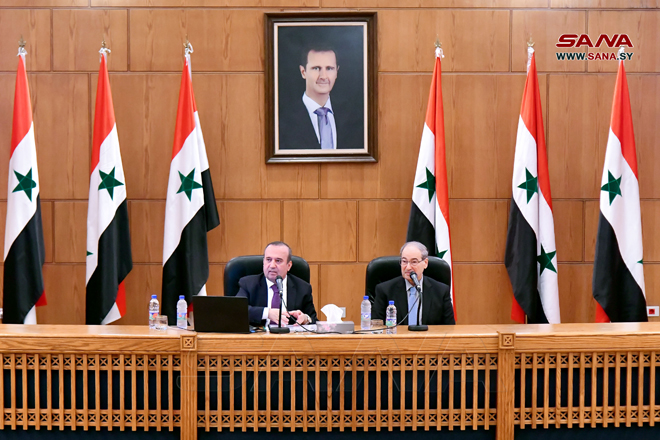Al-Mikdad: “Water has become a political issue…our ambassadors and diplomatic missions play a key role in defending the country’s water resources”
Damascus -Minister of Foreign Affairs and Expatriates Faisal Al-Mikdad has stressed that water has been turned into a political issue and our ambassadors and diplomatic missions need to know the situation of water resources so they can defend it in front of the world Public opinion.
He made the remarks during the regular meeting of Syrian ambassadors and heads of diplomatic missions abroad which resumed its third day activities on Tuesday at the Ministry of Foreign Affairs and Expatriates.
Minister Al-Mikdad added, during the opening of the first session, which was attended by the Minister of Water Resources in the caretaker government, Eng. Hussein Makhlouf: “The Syrian diplomatic cadre’s knowledge of the water situation is an integral part of the process of following up on international talks on water and the obligations that we should know when we negotiate this file”.
In addition, Minister Makhlouf spoke about the important role of the ambassadors and heads of diplomatic missions, in obtaining Syria’s water rights and in conveying the true picture of Syria’s commitment to all water agreements with neighboring countries and with Arab brothers.
He pointed out that we have a very important and well-studied set of projects and we need partnerships with these friendly countries to implement them.
Minister Makhlouf also mentioned during the meeting the basic principles of public policies related to water resources and water-sharing agreements with neighboring countries.
Makhlouf stressed that climate change has impact on the country, including drought, lack of rain, the decline of snow cover, the frequency of extreme heat and extreme cold, soil degradation, and reduced agricultural productivity, caused desertification and a decrease in rivers water and an increase in population.
Minister Makhlouf reviewed the water situation in the occupied territories, especially what the Israeli occupation is doing in terms of stealing the water of the occupied Syrian Golan, exploiting groundwater, and changing the paths and outlets.
He also spoke about the practices of the Turkish occupation and those associated with it from terrorists in Hasaka and the northern countryside of Aleppo, and depriving the people of Hasaka of the water of the Allouk station, in addition to sabotaging this station.
The second session of the third day of the meeting hosted the Minister of Interior in the caretaker government, Major General Muhammad Al-Rahmoun, where he reviewed the reality of the ministry’s work in issues related to citizens’ affairs outside Syria. He pointed to the ongoing cooperation between the Ministry of Interior and embassies in solving citizens’ problems through a joint committee between the two ministries to coordinate work in the services provided to the displaced Syrians wishing to return.
Minister Al-Rahmoun spoke about the electronic visa and its issuance to facilitate those wishing to visit Syria, reviewing the facilities provided to displace Syrians on the borders. He pointed to the establishment of civil affairs centers that serve any displaced Syrian who has lost his documents and provide him with temporary documents until he visits civil affairs to obtain official documents.
The third workshop addressed unilateral coercive measures and their negative effects, and ways to address them. It was moderated by Ambassador Dr. Imad Mustafa, Director of the Diplomatic Institute. It included a legal refutation of the pretexts used by the United States and the European Union to impose such illegal measures, in order to exert pressure on other countries that adhere to their sovereignty and the independence of their national decision.
The various negative effects resulting from imposing these measures on various aspects of the lives of the targeted peoples were also explained.
A fourth workshop was held on Western moves targeting Syria within the framework of exploiting various international organizations, which was moderated by the Deputy Minister. It discussed ways to confront the Canadian-Dutch allegations in the move against Syria before the International Court of Justice, the Western and politicized exploitation of the Organization for the Prohibition of Chemical Weapons, and its efforts to establish biased mechanisms against Syria such as the Independent Investigation Mechanism, the International Foundation for Missing Persons, and other tools that were created under Western pressure and blackmail.
Raghda Sawas

